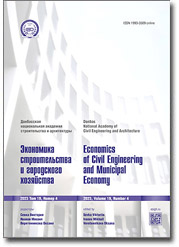Quality of Life as a Key Indicator of Territorial Development
Abstract: The concept of quality of life is considered as an integral indicator reflecting the level of socio-economic development of the territory. The key factors affecting the quality of life are analyzed, such as the income of the population, the level of education, accessibility and quality of medical services, the environmental situation, housing conditions and others. Special attention is paid to methods of assessing the quality of life and their application in the context of territorial planning and management. Based on the conducted research, the relationship between the indicators of quality of life and the effectiveness of socio-economic development of the territory is revealed, recommendations are offered to improve the quality of life of the population through improved management at the regional level. Ensuring a high quality of life for the population is a key task of the state authorities. The study and assessment of the quality of life of the population of the territory is carried out in order to identify factors that have a negative impact and implement measures to eliminate them. For the regions of the Russian Federation, monitoring the quality of life is especially relevant due to their uneven development.
Keywords: quality of life, quality of life index, population, happiness index, region, territory
Pages: 105-113.
For citation:
For citation: Kalustyan, Y. V. Quality of Life as a Key Indicator of Territorial Development. – Text : electronic. – In: <em>Economics of Civil Engineering and Municipal Economy</em>. – 2024. – Vol. 20, N 2. – Р. 105-113. – doi: 10.71536/esgh.2024.v20n2.3. – edn: lejkug . – ISSN 1993-3509.

Vol. 20, N 2 (2024)
Journal: Economics of Civil Engineering and Municipal Economy
Publish house: Donbas National Academy of Civil Engineering and Architecture
Journal: Economics of Civil Engineering and Municipal Economy
Publish house: Donbas National Academy of Civil Engineering and Architecture
